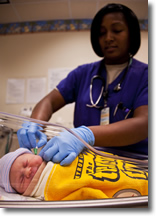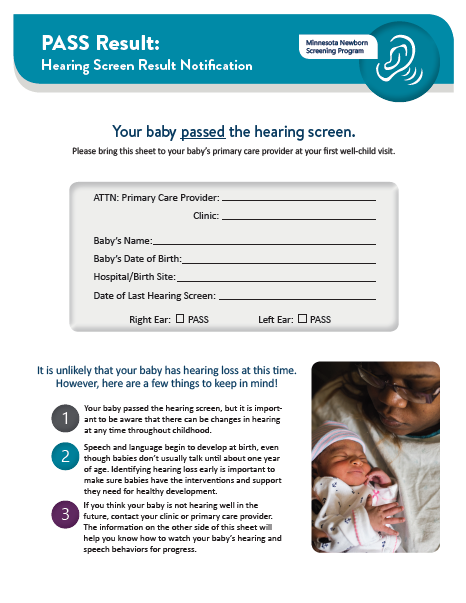Contact Info
Hearing Screening in the Well-Baby Nursery
 Minnesota state law (Statute 144.966) outlines the following core responsibilities for all birth hospitals in Minnesota. There are extra considerations for Hearing Screening in the NICU. If you are not in a hospital, please visit our Out-of-Hospital Hearing Screening page.
Minnesota state law (Statute 144.966) outlines the following core responsibilities for all birth hospitals in Minnesota. There are extra considerations for Hearing Screening in the NICU. If you are not in a hospital, please visit our Out-of-Hospital Hearing Screening page.
- Educate parents on newborn hearing screening information and parental options to prior to screening. Education materials to aid in the discussion are available free of charge and can be ordered from our Educational Materials and Forms About Newborn Screening page. See our Prenatal Education and Postnatal Education pages for more.
- Perform screening on all infants prior to discharge unless parents have signed the Parental Refusal or Delay of Newborn Screening (PDF) form. See below to learn how to perform screening.
- Document results of all hearing screening. See below to learn how to document results.
- Communicate and report results to parents, primary care providers, and the Newborn Screening Program within 7 days of screening. See below to learn how to communicate results.
- Plan for alternative testing strategies when equipment is not working properly.
- Schedule outpatient follow-up within 1-2 weeks for infants who do not pass. This is not a statutory requirement, but is highly recommended for quality assurance.
Hearing screening often involves health care professionals outside the nursery as well. See also our Primary Care Providers and Hearing Screening and Audiologists and Hearing Screening pages.
Who can perform screening?
Newborn hearing screening can be performed by volunteers, nurses, midwives, audiological technicians, audiologists, and other trained personnel in hospitals, NICUs, and out-of-hospital birth environments. Initial training for those who perform newborn hearing screenings, as well as refresher trainings and periodic monitoring of staff performance, are essential to assuring quality screening. See our Newborn Screening Training page for training options.
Studies have shown that ongoing experience with screening is an important factor in maintaining low and accurate REFER rates in hearing screening. Therefore, we recommend designating specific staff members to conduct hearing screens for all newborns at a given facility. A trained screener should be available at all times to ensure that every newborn is screened.
When must screening occur?
Initial hearing screening is best performed after 12 hours of age and should be complete prior to discharge. Screening performed prior to 12 hours of age is more likely to yield a false positive result, depending on the equipment used. According to Minnesota statute, the hospital that discharges the newborn home is responsible for ensuring that newborn hearing screening is complete.
Screening technologies
Newborn hearing screening must be performed using objective physiological screening methods that do not require behavioral responses from the infant. Otoacoustic emissions (OAE) and automated auditory brainstem response (AABR) are the two types of technology proven to be effective in screening for hearing loss in newborns.
Each technology has its advantages and disadvantages. Either technology, or a combination of the two, is considered appropriate for newborn screening in the well-baby nursery. Infants in the NICU must have AABR included as part of their screening.
Policies and procedures
Every nursery performing newborn hearing screening should have a written policy and procedure for staff to follow when screening newborns for hearing loss. A nursery’s policy should address the following topics:
- Screening procedure
- Equipment
- Follow-up for infants with REFER results
- Communication with parents
- Staff training
- Staff re-training
- Documentation
- Reporting results to the Minnesota Department of Health and primary care
- Plan for equipment failure
- Quality assurance
Our audiologists are available to assist in developing and revising policies and procedures to fit the needs of individual hospitals. For sample policies and procedures or to arrange a site-visit with an audiologist, please Contact the Newborn Screening Program.
Key to the newborn screening process is timely follow-up, thorough documentation and effective communication between the Newborn Screening Program, providers, specialists, and families. Documentation helps facilitate prompt diagnosis, family support, and implementation of early intervention services.
Discharging facility responsibilities
Final inpatient newborn hearing screening results should be documented in the infant’s medical record. If the birth facility did not schedule outpatient follow-up for a child who referred, the primary care provider should schedule follow-up as soon as possible.
All screening/rescreening should be completed by one month of age, and diagnosis completed no later than three months of age.
Primary care provider responsibilities
Infants whose final hearing screen result is a PASS do not require immediate follow-up. However, changes in hearing can occur at any time. Primary care providers are expected to continue to monitor hearing and discuss any parental concerns throughout the child’s life.
Infants whose final hearing screen result is a REFER require immediate follow-up. The primary care provider should refer and schedule the infant for follow-up as soon as possible. All screening/rescreening should be completed by one month of age, and diagnosis completed no later than three months of age.
To learn more about PASS and REFER results, visit our Results From Hearing Screening Explained page.
Newborn Screening Program responsibilities
Our staff will contact birth hospitals, primary care providers, and specialists to ensure that every infant born in Minnesota undergoes a hearing screen and receives appropriate follow-up when necessary.
In accordance with Minnesota statute, all newborn hearing screening results and follow-up arrangements should be conveyed by hospitals to the newborn’s parents, the infant’s primary care provider, and the Newborn Screening Program.
To parents
Share the final hearing screening results with parents both verbally and in writing at the time of hospital discharge.

If the infant receives a PASS result, give the parent(s) the PASS Result: Hearing Screening Result Notification (PDF) sheet and explain that changes in hearing can occur at any time. Encourage parents to contact their infant’s primary care provider should concerns arise.
If the infant receives a REFER result, give the parent(s) the REFER Result: Hearing Screening Result Notification (PDF) sheet and discuss a plan for follow-up. Assist parents in scheduling the necessary appointments as soon as possible and encourage them to discuss hearing results with their infant's primary care provider.
Result notification sheets are available to order free of charge on the Educational Materials and Forms About Newborn Screening page. To learn more about PASS and REFER results, visit our Results From Hearing Screening Explained page.
To the Newborn Screening Program and primary care providers
As of January 2017, all hospital submitters complete secure electronic submission of newborn hearing screen results to the Newborn Screening Program directly from their hearing screening devices. Through MNScreen, all inpatient results, regardless of outcome, and any outpatient rescreening results completed by the nursery unit will be transmitted to the Newborn Screening Program.
Previously, hearing screening results could be reported in a section of the newborn screening card used for blood spot collection. This section is no longer available for reporting hearing screening results. Midwives who provide newborn hearing screening were transitioned to electronic submission of results during 2017.
Minnesota law also requires that the infant's primary care provider be sent final results from the inpatient newborn hearing screen, regardless of test outcome, as well as any outpatient rescreening results completed by the nursery unit.
For all infants with REFER results requiring further testing, please notify the program and the primary care provider of when and where follow-up testing will take place. Hearing screening results and follow-up plans should be communicated to the primary care clinic within 10 days of screening. See our Primary Care Providers and Hearing Screening page to learn about the role of primary care in the process.
Resources
The Minnesota Early Hearing Detection and Intervention (EHDI) website provides many resources for inpatient screening including best practice guidelines, tools for improvement, and free education materials. You can also Contact the Newborn Screening Program staff with questions.
